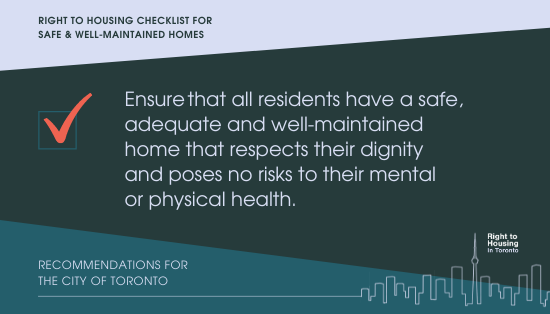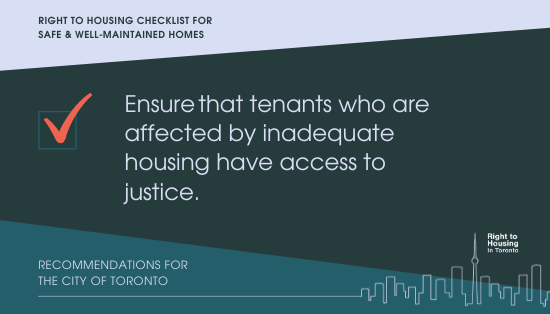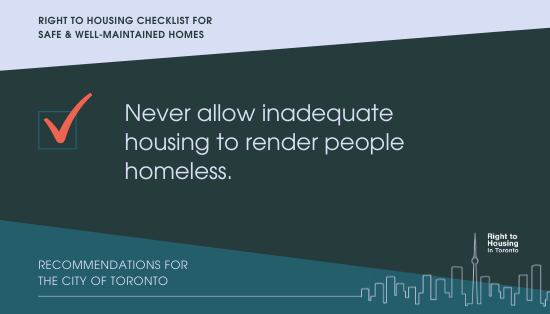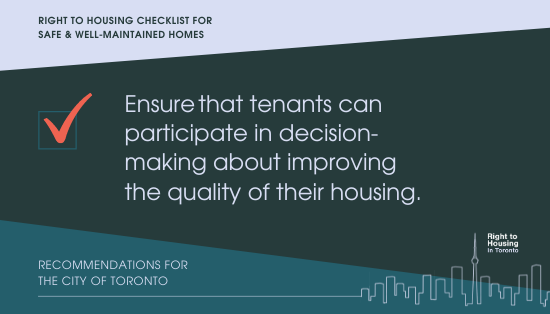The following key recommendations for the City of Toronto from our report Safety and Maintenance Rights Review are based on the right to housing and human rights principles and aim to ensure that housing is safe, adequate and well-maintained. The City must abide by these principles to implement comprehensive and rights-based policies and strategies for ensuring the adequacy and quality of housing for all residents in the City, including those living in social housing, multi-tenant homes and private market rental housing.
We invite advocates, groups and organizations to incorporate these recommendations into their own reports, policy proposals and submissions, calls to action, and meetings with elected officials and City staff to improve the safety and maintenance of homes in Toronto.
- Read our recommendations below
- Read the full report
- Read the executive summary
Our recommendations for safe and well-maintained homes in Toronto
1. Ensure that all Toronto residents have equal access to a safe, adequate and dignified home.
Principle 1: Everyone must have a safe, adequate and well-maintained home that respects their dignity and does not pose risks to their mental or physical health.
Recommendations for the City of Toronto:
-
- Ensure the housing under the City of Toronto’s ownership meets housing adequacy standards and is maintained in a state of good repair by prioritizing the capital repair needs of TCHC homes.
- Ensure Toronto’s affordable private rental homes meet housing adequacy standards and are in a state of good repair and, in particular, prioritize:
-
-
- Dedicating the maximum available resources to advance habitability and adequacy standards in the City’s private rental homes.
- Enforcing property standards related to health and safety.
- Bringing the worst-performing buildings back into a state of good repair.
- Providing stronger incentives for owners to repair and retrofit units, ensuring that affordability levels are maintained.
- Ensuring revitalization plans meet the housing needs of existing tower residents and build protections against displacement.
-
-
- Protect the safety and well-being of all renters, regardless of the type of housing in which they reside by:
-
- Ending the discriminatory restrictions on multi-tenant housing so that the safety and well-being of all renters is protected, regardless of income or housing type.
- Establishing a unified regulatory regime where multi-tenant houses are permitted in every residential zone, with clear standards to ensure adequacy and safety for all residents.
-
- Prioritize deep capital repairs and retrofits in low-income and racialized neighbourhoods.
↓ Download & share this graphic

2. Meaningful engagement and effective participation from tenant residents
Principle 2: The City must ensure that tenants are able to meaningfully and effectively participate in decision making affecting them, including the design and implementation of policies, programs and practices designed to improve the quality of their housing.
Recommendations for the City of Toronto:
-
- Engage with low to moderate income renter communities and encourage participation in decision-making.
- Proactively engage with tenant communities and build avenues for their participation in property standard enforcement actions.
- Increase funding for community development and tenant organizing.
- Engage and support the creation of tenant associations in tower communities.
- Develop more ways to bring tenants’ lived experience to inform policy decisions related to improving the safety and adequacy of housing.
- Revitalize existing high-rise apartment buildings through a community-centered approach.
↓ Download & share this graphic
3. Access to justice must be ensured for individuals and communities affected by inadequate housing.
Principle 3: The City must ensure access to justice for individuals and communities directly affected by inadequate housing. In particular, the City must ensure timely responses and remedies to tenants who exercise their right to safe, adequate and well-maintained homes.
Recommendations for the City of Toronto:
-
- Enhance the enforcement of property standards to keep renters safe by strengthening the City’s primary mechanism to provide tenants an opportunity to pursue their right to a safe and adequate home:
-
- Continue to fund the RentSafeTO program and strengthen enforcement activities.
- Increase engagement with residents and ensure tenants are informed about the RentSafeTO program.
- Improve RentSafeTO’s complaint mechanisms and include unit inspection during building evaluations.
- Increase the number of RentSafeTO Bylaw Enforcement Officers (BEOs) to allow for more comprehensive evaluations.
- Ensure RentSafeTO’s evaluation system speaks to the broader Property Standards complaint system to cross reference service requests and tenant complaints.
-
- Enhance the enforcement of property standards to keep renters safe by strengthening the City’s primary mechanism to provide tenants an opportunity to pursue their right to a safe and adequate home:
↓ Download and share this graphic

4. Inadequate housing must never be allowed to render people homeless.
Principle 4: In situations where the safety and adequacy standards are so lacking that an individual cannot remain in their home, they must not be rendered homeless.
Recommendations for the City of Toronto:
-
- Meaningfully engage with individuals who are facing the loss of their home due to severe breach of adequacy standards and provide immediate assistance with relocation.
- Prior to losing their home, tenants must be provided with adequate alternative housing options of similar size, quality and cost and in close proximity to their community, employment, schools, services, etc.
- Where the individual facing the loss of their home resides in City-owned housing, the City should provide financial compensation.
- Where the individual facing the loss of their home resides in private housing, including in multi-tenant housing, the City should consider all available licensing and enforcement options at their disposal to sanction the housing provider. The City should also consider providing financial compensation to affected individuals.
- In all cases, the City should ensure that the housing be returned to a state of good repair as soon as possible and that any tenants displaced be provided with a right of first return upon the completion of the repairs, and do everything it can within its power to ensure that tenants return at the same rental rate as before.
↓ Download and share this graphic


